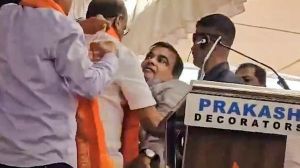- India
- International
‘Muslim women face discrimination in government-run healthcare institutions’
‘Misbehaviour common with all economically disadvantaged women, specially bad for Muslims’
 Reshma Shaikh (34), a resident of Bandra East, claims she was slapped by a doctor at a civic-run hospital when she was screaming in labour pain. Express
Reshma Shaikh (34), a resident of Bandra East, claims she was slapped by a doctor at a civic-run hospital when she was screaming in labour pain. Express
When Behrampada resident Ruhi Fatema (30) delivered her first baby in Bandra West-based government hospital in December 2016, she was shocked when the gynaecologist slapped her during labour pain. No curtains were drawn to offer her privacy, instead she found ayahs ‘pointedly rude’. She says later, when other women who came to see her newborn shared similar experiences, she realised such behaviour was common towards Muslims. “It was humiliating,” she sums up.
What Else Is In News?
Two reports, one commissioned by the Ministry of Minority Affairs and second a study by NGO Cehat, have found similar discrimination against women of marginalised community in government healthcare institutions.
The Multifactorial development of Muslims report commissioned by the state was prepared by Research Centre for Women Studies, SNDT, after interviewing close to 250 Muslim families and married women in Mumbai slums, where 77 per cent were found to have access government hospitals. The report found that Muslim women felt they were treated badly because they are Muslims, and are at the receiving end of abuses.
“Government does not discriminate. But those implementing the services have bias against this community. It is not just hospitals, educational institutes too were found to discriminate against Muslims,” said Parul Khanpada, a member of the research team, adding that women were humiliated most during registration of their newborns, when they are “often taunted for birthing several children”.
A similar report from NGO Cehat, which interviewed 85 slum women — 44 Muslims and 41 non-Muslims — observed that there is a triple burden of “being poor, female and Muslim” when it comes to access to healthcare facilities for these women. “Women are made to take off the burqa at gate of the hospital as there have been incidents of children being stolen,” the study said, further adding they were “embarrassed and humiliated by derogatory labels”.

Munni, a Kurla resident, decided to give birth to her fourth child at home, fearing she would be taunted by the staff in nearby BMC-run hospitals. She paid Rs 300 to a midwife.
“It is less stressful at home,” she said. According to social activist Subarna Ghosh, in a recent programme in Govandi slums, Muslim women echoed their embarrassment on treatment at public hospitals. “Child birth is the most emotional moment for a mother. Muslims are often ridiculed, more than Hindu women,” Ghosh said.
Hasina Khan, attached with Bebaak Collective, said these issues have been raised with the state minority commission, but no action has been taken. “In Muslim ghettos, availability of government’s specialised healthcare is missing. Mumbra has no government hospitals, just a maternity home,” she said. Several Muslim women, she adds, have started visiting private practitioners to avoid humiliation.
In Bandra East, Reshma Shaikh (34) had visited a BMC-run hospital in 2007 for her third delivery. “I had partial paralysis on my face. I was screaming because of pain, and the lady doctor slapped me on my cheek. I could not tell my family until I was discharged,” she said. Shaikh’s face remained swollen for a week. She claims that the foetus’s heart rate was irregular and she was scared for her baby’s survival, which is why she decided to avoid any complaint against the doctor.
Her husband is a taxi driver. After the episode, she visited private clinics for treatment but soon switched back to BMC hospital due to lack of finances.
“The general perception of Muslim women in government hospitals is that they give birth to multiple children, are uneducated and use the burqa to steal kids,” Khatoon Shaikh, founder of Bharatiya Muslim Mahila Andolan, said.
According to Dr Padmaja Mavani, professor of obstetrics department at KEM hospital, “There is a strong need of sensitisation, specially amongst trainee doctors” to improve doctor-patient relationship.
The Director of medical education, Dr Pravin Shingare, however, claimed that inculcating ethical practices in student’s medical curriculum could help change mindset.
The Cehat study found that misbehaviour was common with all economically disadvantaged women. While non-Muslims are made to wait longer and expected to bribe nurses, Muslim women are accused of giving birth to several children and of illiteracy by hospital staff.
Sangeeta Rege, from Cehat, said “there is a certain notion that public sector hospitals carry against marginalised communities”. “Even the Sachar Committee report talks about discrimination towards Muslims in various sectors,” she said.
tabassum.barnagarwala@expressindia.com
Apr 24: Latest News
- 01
- 02
- 03
- 04
- 05







































